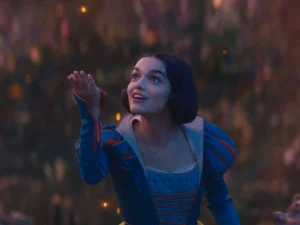From the moment the film was announced, it was clear that Disney intended to reinvent “Snow White” for a modern audience. Casting Rachel Zegler in the titular role, alongside Gal Gadot as the menacing Evil Queen, marked a daring departure from the traditional Disney princess mold. However, this bold reimagining has not come without its share of detractors.
Casting Controversies and Vocal Criticism
Shortly after the film’s promotional materials hit social media, an online commenter questioned Zegler’s suitability for the role, suggesting that Disney should have cast a soprano to embody the beloved princess.
In response, the star swiftly fired back on Instagram with a terse “i am a soprano!”—a retort that not only silenced her critics but also underscored the passion she brings to the character. Yet, this wasn’t the only controversy surrounding her casting.
At a recent early screening, an emotionally charged Rachel Zegler delivered a heartfelt speech, visibly moved as she recounted her lifelong connection to the character.
“This movie is a huge piece of my heart,” she confessed to a captivated audience. Amid tears and declarations of love for everyone involved in the film’s journey, Zegler also addressed the backlash head-on.
“I know I’m not everyone’s cup of tea, but I am here to bring a fresh, modern perspective to Snow White,” she said. While many fans praised her vulnerability and candor, others remained unconvinced, fueling a debate that has since expanded into what some are calling “Snow White and the Seven Kajillion Controversies.”
Critics argue that altering the beloved classic not only risks alienating longtime fans but also opens the door to unnecessary social and cultural commentary. Supporters, however, celebrate the film’s willingness to challenge established norms and redefine what a princess can be in today’s world.
In this polarized environment, every interview, social media post, and public appearance by Zegler is dissected for hints about the film’s overall vision—and its potential impact on modern storytelling.
A Reimagined Story or a Disrespect to Tradition?
Beyond the casting debates, the very concept of remaking a cherished classic has its detractors. Traditionalists point to Disney’s original “Snow White and the Seven Dwarfs” as an unparalleled work of art and warn that any significant changes risk diluting its timeless magic. Some critics have even labeled the new version as a “corporate cash grab,” designed less to honor the original than to capitalize on the current trend of live-action remakes.
The film’s reimagining of iconic sequences has also drawn scrutiny. For instance, updated interpretations of pivotal moments—such as the transformation of the dwarfs into a more diverse and modern ensemble—have sparked both praise and criticism. Fans are divided: some applaud the inclusivity and fresh energy brought to these classic scenes, while others lament the loss of the original’s charm.
In interviews, Disney executives have defended their creative choices, insisting that the changes are necessary to resonate with today’s global audience.
“We’re not trying to erase history; we’re simply reinterpreting it for a new generation,” one executive explained, emphasizing that the core themes of hope, courage, and transformation remain intact.

Box Office Buzz: A Promising Start Amid the Controversy
While the film’s creative choices have ignited debate, its box office performance is emerging as a bright spot in an otherwise turbulent launch. Early previews have reported a robust $3.5 million in ticket sales, a number that not only exceeds the early figures for “Dumbo” but also stands competitively close to what “Kung Fu Panda 4” managed in its debut.
Breaking Down the Numbers
For a film that is still in its preview phase, $3.5 million is an impressive figure—especially given the heavy scrutiny it has already faced.
Analysts note that this performance signals a strong interest from audiences, driven by curiosity about Disney’s modern take on a fairy tale as well as the star power of its cast.
Compared to “Dumbo,” which struggled to attract viewers in its early run, “Snow White” appears to be capturing attention both in traditional theaters and on digital platforms.
Industry experts suggest that this encouraging start could be attributed to several factors:
- Star-Driven Appeal: With high-profile names like Rachel Zegler and Gal Gadot attached to the project, the film benefits from an instantly recognizable roster that draws in diverse audiences.
- Nostalgia Meets Innovation: While controversy surrounds the film’s new direction, many viewers are eager to see how a modern reinterpretation of a beloved classic holds up. This blend of nostalgia with innovative storytelling creates a unique draw.
- Robust Marketing Campaign: Disney’s marketing machine is in full swing, leveraging social media teasers, interviews, and behind-the-scenes footage to build anticipation. The company’s ability to generate buzz—even in the face of criticism—speaks volumes about its promotional prowess.
The preview figures, when contextualized against recent box office benchmarks, are particularly notable. “Kung Fu Panda 4” set a high standard with its early numbers, and while “Snow White” is not quite there yet, its performance suggests that it is on a similar trajectory.
Analysts predict that if the film maintains its momentum in subsequent screenings, it could well surpass expectations at the domestic box office, setting the stage for a strong summer release.
Audience Reception and Social Media Dynamics
Social media has played a critical role in shaping the narrative around “Snow White.” Every tweet, Instagram story, and TikTok video about the film has contributed to a complex, often contradictory, picture of public opinion.
Hashtags such as #SnowWhiteControversy, #NewSnowWhite, and #KajillionControversies have trended frequently, with users sharing everything from rave reviews to scathing critiques.
On platforms like Twitter, conversations are dominated by passionate debates about the film’s artistic merit versus its deviations from the original. Influencers and film critics alike have weighed in, with some calling the movie a “refreshing reinvention” and others dubbing it “a mess of modernity.”
Despite the polarized views, the sheer volume of discussion has undoubtedly contributed to the film’s strong preview numbers. In today’s digital age, controversy can be a potent marketing tool—one that Disney appears to have harnessed, whether intentionally or not.
One viral clip, featuring Rachel Zegler’s emotional speech at an early screening, has been shared millions of times. In it, she speaks candidly about her journey to embody Snow White and the challenges of defying expectations.
This raw, unfiltered moment has resonated with many viewers, sparking a wave of supportive comments from fans who admire her courage and authenticity. For many, it is precisely this willingness to be vulnerable that makes the film worth watching, even if its changes are not universally accepted.

Navigating the Controversies: What’s Next for Disney’s “Snow White”?
With controversy and strong early box office numbers in equal measure, the fate of Disney’s new “Snow White” hangs in a delicate balance. As the film continues its theatrical run, its performance—and the public’s reaction—will likely serve as a case study in how modern reboots can both honor and challenge traditional narratives.
Balancing Tradition and Innovation
For Disney, the challenge is twofold: to satisfy longtime fans who hold the original “Snow White” in sacred regard, while also capturing the interest of a new generation that demands diversity, inclusivity, and fresh perspectives.
The studio’s decision to modernize key elements of the story, from the casting to the portrayal of iconic characters, has sparked a cultural debate that goes far beyond box office numbers.
Critics have argued that in its quest for innovation, the film risks alienating those who cherish the classic version’s simplicity and charm. Conversely, supporters claim that the reimagined “Snow White” is a necessary evolution—a way to keep the story relevant in an era where representation matters more than ever.
In interviews, several members of the creative team have stressed that their goal was not to discard the essence of the original but to build upon it in a way that speaks to today’s audiences.
Disney executives have hinted that the film is only the first step in a broader strategy to rework some of its most iconic properties for a modern era. “We’re looking to create stories that reflect the world as it is now,” one executive remarked.
“Our goal is to honor our heritage while also embracing the future of storytelling.” Whether this delicate balancing act will pay off remains to be seen, but early indications from the box office suggest that there is significant curiosity—and potential—among moviegoers.
The Role of Criticism in Shaping the Narrative
Controversies, while sometimes seen as purely negative, can also act as catalysts for constructive dialogue. In the case of “Snow White,” the debates surrounding its casting, storyline changes, and thematic direction have prompted meaningful conversations about representation, artistic freedom, and the evolving nature of fairy tales in the 21st century.
Film scholars and industry analysts are already examining the movie as an example of how traditional narratives are being reshaped by contemporary values. Some predict that the film will be revisited in academic circles as a landmark case study—a work that challenged conventions and forced both fans and critics to reexamine what makes a story timeless.
Social media discussions, though often heated, have also provided a platform for diverse perspectives. While some users vehemently oppose the changes, others have embraced them as a sign of progress.
This rich tapestry of opinions not only fuels the public discourse but also influences how future projects might be developed. The lessons learned from the “Snow White” controversy could very well inform Disney’s strategy in tackling its upcoming reboots and remakes.
Box Office Projections and Future Potential
From a commercial standpoint, the film’s strong preview numbers are an encouraging sign. The $3.5 million it has generated in early screenings demonstrates that controversy can coexist with commercial success—even if it means ruffling some feathers along the way.
Industry insiders are optimistic that as word-of-mouth spreads and more viewers experience the film firsthand, its box office performance will continue to climb.
Moreover, the film’s early success may have broader implications for Disney’s slate of live-action remakes. If “Snow White” manages to translate its initial preview momentum into sustained theatrical performance, it could signal a renewed appetite for reimagined classics.
This, in turn, might encourage the studio to invest further in projects that challenge traditional storytelling methods while staying true to the essence of their original creations.
Final Thoughts
Disney’s new “Snow White” is more than just a film—it’s a cultural phenomenon that encapsulates the challenges of reinterpreting beloved stories for modern audiences. With its $3.5 million preview debut outperforming recent titles like “Dumbo” and approaching the early numbers of “Kung Fu Panda 4,” the film’s commercial promise is undeniable. At the same time, its numerous controversies—from casting debates to artistic choices—underscore the passionate, often polarized reactions that reboots can provoke.
Rachel Zegler’s bold defense of her casting and her emotional outreach during screenings have cemented her status as both a relatable and resilient figure in the face of online criticism. Meanwhile, the creative decisions to diversify classic characters and update timeless sequences have sparked a robust dialogue about the future of storytelling.
Whether you view these changes as a necessary evolution or a misguided departure from tradition, there is no denying that “Snow White” has ignited a conversation that extends far beyond the silver screen.




